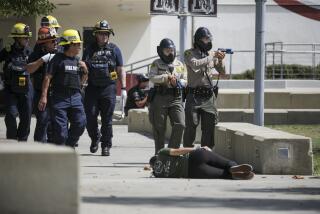FBI Gun-Buyer Screening System Readied
- Share via
WASHINGTON — Every person who tries to buy any type of gun anywhere in the country by late this year will be subjected to a new FBI information system designed to restrict firearms sales, Justice Department officials said Wednesday.
Starting Nov. 30, the Brady gun control law passed by Congress in 1994 will require licensed gun dealers to submit the names of all prospective gun purchasers to the FBI’s “national instant check system” to screen out buyers who have criminal or violent records.
California officials, however, said the system will have little impact in the state, which has a 10-day waiting period for all gun purchases, which is more restrictive than federal law. The screening process at the national level will not affect the California waiting period.
Officials said the FBI’s system will give dealers either a “go ahead” or a “hold” within two minutes. If the answer is “hold” (a tentative denial of purchase), the dealer by law must be given a firm denial within three days or the sale may be completed.
The three-day hold period is designed to allow FBI technicians to make sure their identification is accurate.
“About 80% of all buyers will get an immediate answer that they’re eligible to purchase a gun, that our criminal record center has nothing on them,” an official said.
As a leading state in the screening process, California gun dealers will continue to submit the names of prospective purchasers to the State Department of Justice in Sacramento, which has direct access to state criminal records as well as the FBI’s system.
Gun dealers in most states must contact an FBI national information center in West Virginia on a toll-free telephone line or through a computer connection, officials said. A fee of about $16 per purchase will be charged to the dealer and passed on to the customer in states that do not make their own criminal checks.
Mike Van Winkle, a spokesman for the California Department of Justice, said the state-based record checking system “is meeting the demand very well and we expect that to continue.”
Buyers who would be disqualified are those with felony convictions, those who use illegal drugs, persons judged mentally incompetent and those under a court order restraining them in domestic violence cases, officials said. Persons who have renounced U.S. citizenship or have been dishonorably discharged from the military are ineligible to own guns, according to the Brady law.
Atty. Gen. Janet Reno told reporters that “it has been a great challenge” for the FBI to develop its screening system by the Nov. 30 deadline mandated by Congress. It has required the hiring of hundreds of new employees, she said.
“More than 11 million guns are sold in this country every year and the FBI will be linked with more than 60,000 gun dealers around the country,” she said.
The National Rifle Assn. has supported the FBI screening system as a means of denying guns to criminal elements while protecting the rights of law-abiding citizens. But Tanya Metaksa, the NRA’s chief legislative representative, said the organization strongly objects to “a gun tax” in the form of the $16 screening fee for gun purchasers.
Metaksa said the NRA is urging Congress to waive the charge. The NRA also objects to an FBI proposal to keep records of legitimate gun buyers for an 18-month period, a practice that could allow the government to confiscate guns throughout the country, she said.
More to Read
Sign up for Essential California
The most important California stories and recommendations in your inbox every morning.
You may occasionally receive promotional content from the Los Angeles Times.













